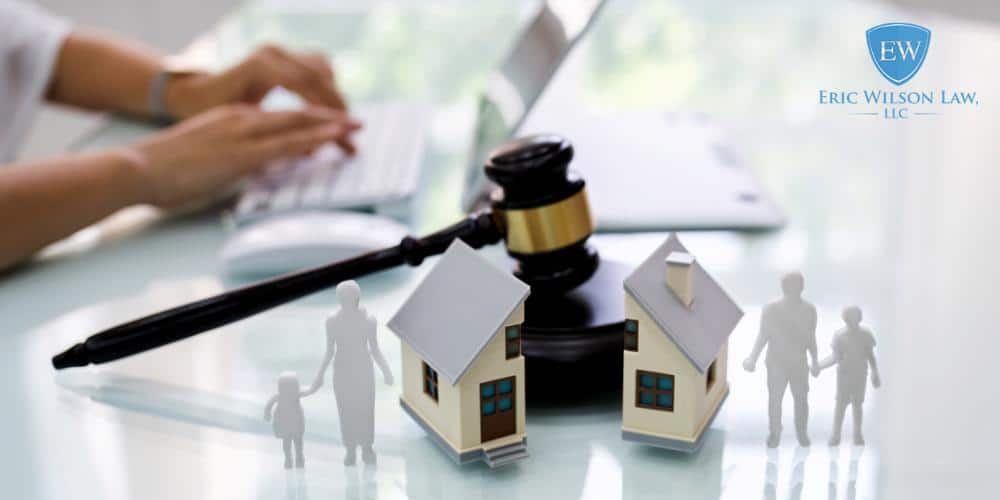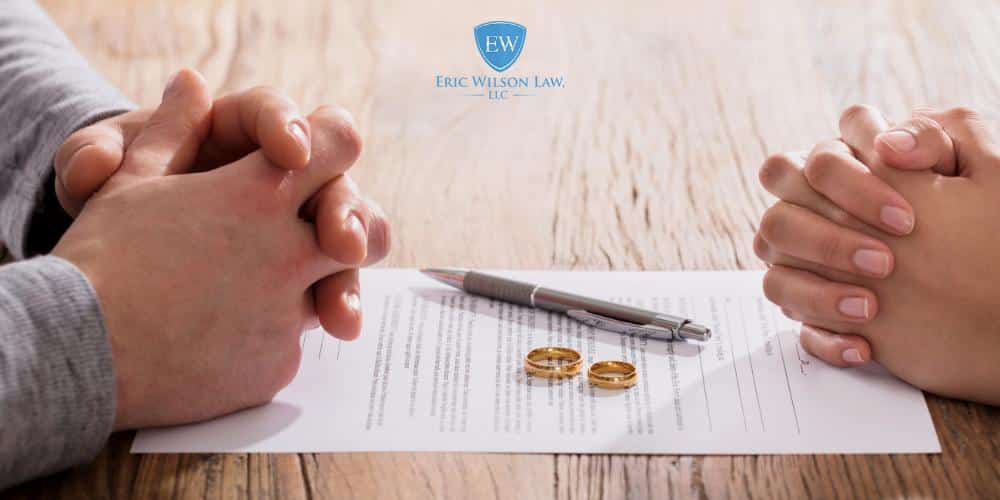Tuscaloosa Bankruptcy and Divorce Lawyer
Divorce is incredibly expensive. Many divorcing spouses have to worry about legal fees, asset division, joint debt division, and alimony or child support debt all with one income. By the time it’s all said and done, many divorced people are looking at mountains of debt. There are many debt relief options out there, but one of the most quick and effective options is filing bankruptcy. This opens up a whole new set of questions and stressors though, like: when should I file for bankruptcy? Which chapter of bankruptcy should I file? Should I file jointly or separately? Tuscaloosa bankruptcy attorney Eric Wilson answers all these bankruptcy and divorce questions below.
Eric Wilson Law in Tuscaloosa, AL is a top-notch debt relief law firm. Our team has extensive knowledge of bankruptcy law, so we have what it takes to relieve your financial distress, especially if you’ve just endured divorce. Call 205-349-1280 to schedule a free consultation today.

Why Do Many People File Bankruptcy After Divorce?
People may speak of divorce and bankruptcy in the same breath for many reasons. Both are legal processes, but one separates you from your ex spouse while the other typically separates or reorganizes marital debt and assets.
But why does a divorce proceeding sometimes warrant a bankruptcy case? The simple explanation is because divorce is expensive, and many people need help with obtaining financial stability after separating from their spouse.
Why is Divorce so Expensive?
It’s no secret that divorce is very expensive. Some people may even pay more for their divorce than their actual wedding. According to a 2022 Forbes article, the average cost of divorce in the U.S. is between $15,000 and $20,000, with the median price tag sitting around $7,000. But why?
Generally, the most expensive divorces are those that are contested. This basically means that the spouses don’t agree on one or more aspects of the divorce process. For example, one spouse may not agree on the property division process. In a divorce case like this, the spouses may need to hire a divorce attorney to settle any disagreements and protect the rights of each spouse. The attorney fees alone are generally the biggest expense. The longer the spouses disagree on various aspects of the divorce, the longer the divorce will take, and the longer the spouses will need legal counsel from a divorce lawyer. Naturally, this gets expensive really quickly.
On the other hand, uncontested divorce proceedings are generally much more affordable. Sometimes, the spouses may not even need legal assistance for their uncontested divorce. This means little to no legal fees. In many cases, these types of divorces can conclude pretty quickly and one or both ex spouses may not need to file for bankruptcy.

How Bankruptcy is Different When Divorce is Occurring
Filing for bankruptcy is generally much more complicated when divorce is involved because a divorce decree will affect property rights, joint income, joint debts, and child support payments/alimony payments, all of which play a huge role in the average bankruptcy case.
That’s why it’s so important to have the best bankruptcy lawyer on your side during this complicated process. Eric Wilson has more than 25 years of experience in handling bankruptcy and divorce petitions. He knows how to navigate the complexities of separating marital debts all while protecting the rights of his clients. He knows how physically, emotionally, and financially distressing a divorce can be for one or both parties. If you’re suffering from major financial instability due to your divorce, let Eric Wilson help.
Divorce Decree
A divorce decree, also called a divorce order, is the legal paperwork that concludes the divorce process. This paperwork may include other important things like property division agreements, parenting agreements (if there are children, of course), and a list of marital debts. If you choose to file for bankruptcy at some point, you will need to show all of this information to your bankruptcy attorney.
Property Division
The property division paperwork is basically a list of all the marital assets that you and your ex spouse owned together and how these assets are supposed to be divided between the two of you. You need to make sure that all the assets listed under your name in the divorce decree are also listed on a Schedule A/B form. Be sure to include any of your post-divorce assets on that form as well.
Marital Debt Division
If you’re planning on filing bankruptcy, you need to list all your marital debts – including joint debt and new, post-bankruptcy debt – on your bankruptcy forms. You also need to explain how these debts were divided during your divorce. For example, some ex spouses divide all marital debt down the middle, while some ex spouses just assign specific debts to each other.
Divorce Related Debt
Because divorce is very expensive, one spouse (or both) may rack up some pretty significant debt during the divorce. For example, you may have divorce-related debt from:
- Lump sum alimony or child support payments.
- Past due alimony or child support payments that built up during the divorce process.
- Money owed to your former spouse in order to settle pieces of shared property. For example, maybe you got the RV during the divorce, so you had to buy out your former spouse’s share through a lump sum payment.
- Attorney fees, if you hired a divorce attorney to handle your proceeding.
It’s important to know that out of this short list of common divorce-related debts, only the property settlement debt and the attorney fees would be dischargeable through a bankruptcy filing. Property settlement debt can only be dischargeable through Chapter 13 though, not Chapter 7.
You can’t discharge alimony or child support debt through any chapter of bankruptcy. In other words, you’re still going to have to pay off that debt on your own once your bankruptcy case concludes. The good news is that bankruptcy will likely discharge the majority of your other unsecured debts, so you shouldn’t be under as much financial strain when paying back alimony and/or child support.
Should I File for Bankruptcy Before, During, or After Divorce?
The answer to this question generally depends on your combined income, what chapter of bankruptcy you want to file, how much shared property and assets you have, and the timeline of your divorce.
In most cases though, you probably shouldn’t file for bankruptcy and divorce at the same time, because this can get complicated quickly. Your legal team may tell you that you will have to put one of the legal processes on hold. Additionally, the automatic stay that comes with every bankruptcy filing will delay property division until your bankruptcy case concludes.
If you expect your income to significantly decrease after divorce, you may want to consider filing for Chapter 7 bankruptcy beforehand. A Chapter 7 petition can be wrapped up within 90 days, so it can be a quick and easy process to precede your bankruptcy. Additionally, you have to make a certain amount of money to pass the Chapter 7 means test, so you may not be able to qualify once you’re officially divorced and possibly surviving on one income. In that case, filing for bankruptcy before your divorce may also be a good idea. If you want to file for bankruptcy before divorce, you should not file for Chapter 13, because those bankruptcy petitions take 3 to 5 years to conclude.
On the other hand, if your individual income will still be high enough for you to file for bankruptcy after divorce, then you can do that too. Filing for Chapter 13 bankruptcy after divorce is a good option at this point, but be sure to speak with a qualified bankruptcy attorney like Eric Wilson before you make any decisions. He will carefully analyze your financial situation and help you determine whether it’s better to file for bankruptcy before your after divorce.

Can a Divorcing Couple File a Joint Bankruptcy Petition?
Yes, divorcing couples can still file a joint petition. If you’re hearing this idea for the first time, you may think it’s crazy, especially if you’re not on good terms with your ex spouse. However, a joint bankruptcy filing can be quicker, easier, and cheaper for everyone involved. That’s because filing for bankruptcy is cheaper with a combined income and it will discharge most unsecured debts between both spouses (therefore reducing the issues you have to decide in divorce court).
It’s important to note that you don’t have to file a joint case if you don’t want to or if you believe you’ll receive more benefits from an individual filing. For example, some people need to file for bankruptcy protection, which makes the most sense to do individually instead of jointly.
If you’re not sure whether a joint bankruptcy proceeding is right for you and your divorce timeline, be sure to consult with Eric Wilson. He will analyze your current situation and help you figure out what will bring you the most financial benefits post-divorce.
Chapter 7 vs. Chapter 13 Bankruptcy
Before filing for bankruptcy, it’s important to know a little bit about the two most common chapters of bankruptcy. This knowledge will also help you decide what is best for you.
Chapter 7 Bankruptcy
Chapter 7 bankruptcy is the most common chapter of bankruptcy that Americans file. This is how it works: you would sell some of your valuable assets and use that money to pay off your qualifying debts. Chapter 7 can wipe out most unsecured debt (and some secured debts) such as credit card debt, medical bills, some tax debts, etc. A Chapter 7 bankruptcy case can conclude in as little as 90 days.
Chapter 13 Bankruptcy
Chapter 13 is also known as “reorganization bankruptcy,” and it is the second most commonly filed chapter of bankruptcy. This is how it works: your bankruptcy lawyer would help you come up with a feasible repayment plan that can be completed between 3 to 5 years. If you follow this repayment plan to a T, then you can expect to be virtually debt free in about 3 to 5 years.

Call a Tuscaloosa Bankruptcy Lawyer at Eric Wilson Law Today
If you’re crumbling under the stress of bankruptcy and divorce, it’s okay to ask for help. Eric Wilson is the best legal representation to have on your side during any type of financial crisis. He knows how physically, emotionally, and financially heartbreaking this situation can be. So let him help you work towards complete debt relief during your bankruptcy and divorce. Call our Tuscaloosa law firm today at 205-349-1280 to get started on your attorney client relationship.
Practice Areas
Office Location
Eric M. Wilson, LLC
1902 8th St Tuscaloosa, AL 35401
205-708-2115
Tuscaloosa Law Office Map and Directions
